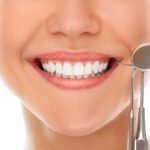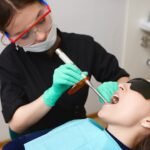Table of Contents
Signs of Aging on Teeth
As we age, our teeth undergo natural changes that can affect their appearance and functionality. One of the most noticeable signs of aging on teeth is enamel erosion, which can result in yellowing or discoloration of the teeth. This occurs due to a variety of factors, including diet, lifestyle habits, and the natural wear and tear that comes with age. Additionally, older adults may experience gum recession, where the gums pull back from the teeth, exposing more of the tooth’s root. This can lead to increased sensitivity and a higher risk of decay.

Another common indicator of aging on teeth is the development of cracks or chips in the enamel. These can occur over time from everyday use or from habits like teeth grinding. As the enamel weakens with age, the likelihood of experiencing these issues increases. Additionally, older adults may notice a decrease in the overall size of their teeth, as wear and tear can cause teeth to become shorter and more prone to damage. It’s essential for individuals to be aware of these signs of aging on teeth and to maintain good oral hygiene practices to prevent further deterioration.
Importance of Dental Hygiene
Maintaining good dental hygiene is crucial for overall oral health and well-being. Proper oral care not only helps prevent tooth decay and gum disease but also plays a significant role in preventing other systemic health issues. Regular brushing, flossing, and dental check-ups are essential practices that can contribute to a healthy smile and a healthier body.
Neglecting dental hygiene can lead to a host of problems, including cavities, gum disease, bad breath, and even tooth loss. Poor oral health has been linked to various medical conditions such as heart disease, diabetes, and respiratory infections. By prioritizing dental hygiene, individuals can significantly reduce the risk of developing these health complications and improve their quality of life.
Common Dental Issues in Older Adults
As we age, our teeth undergo a variety of changes that can lead to common dental issues in older adults. One prevalent concern is tooth decay, which can be exacerbated by factors such as dry mouth or a diet high in sugars. Additionally, older adults may experience receding gums, which can increase the risk of root decay and sensitivity.

Another common dental issue among older adults is periodontal disease, also known as gum disease. This condition can cause gum inflammation, bleeding, and even tooth loss if left untreated. Poor oral hygiene practices, along with underlying health conditions such as diabetes, can contribute to the development and progression of gum disease in older individuals.
Tips for Maintaining Strong Teeth
Ensuring the strength and durability of your teeth is crucial for maintaining good oral health as you age. One key tip is to be mindful of your diet, as consuming foods high in sugar and acidic content can lead to tooth decay and erosion. Opt for a balanced diet rich in calcium, vitamins, and minerals to fortify your teeth and prevent potential damage.
Another vital tip is to maintain a consistent oral hygiene routine that includes brushing your teeth twice a day with fluoride toothpaste and flossing daily. This helps remove plaque buildup, which if left unchecked, can lead to gum disease and tooth decay. Additionally, using mouthwash can further protect your teeth by reducing bacteria in the mouth and promoting a healthier oral environment.
| Habit | Benefit |
|---|---|
| Brush twice daily and floss once daily | Removes plaque and bacteria, preventing cavities and gum disease. |
| Use a soft-bristled toothbrush and fluoride toothpaste | Protects enamel and removes plaque effectively without damaging teeth. |
| Brush for at least two minutes | Ensures thorough cleaning of all tooth surfaces. |
| Use proper brushing technique | Gently brush in circles, reaching all tooth surfaces and gum line. |
| Floss daily | Removes plaque and food particles between teeth where brushing can’t reach. |
| Eat a healthy diet | Limit sugary and acidic foods and drinks, which contribute to tooth decay. |
| Drink plenty of water | Helps wash away food particles and keeps your mouth hydrated. |
| Don’t use your teeth as tools | Avoid opening bottles, chewing on hard objects, or using them for anything other than eating. |
| Visit your dentist regularly | Schedule checkups and cleanings for professional cleaning and early detection of any problems. |
| Consider using mouthwash | Choose a fluoride mouthwash for additional protection against cavities, but don’t use it as a substitute for brushing and flossing. |
| Manage stress | Chronic stress can contribute to teeth grinding and clenching, damaging teeth. Practice relaxation techniques like meditation or yoga. |
| Quit smoking | Smoking weakens the immune system and increases the risk of gum disease and oral cancer. |
Regular Dental Check-Ups
Regular dental check-ups are essential for maintaining good oral health and preventing potential dental issues. During these appointments, your dentist will thoroughly examine your teeth and gums, looking for any signs of decay, gum disease, or other abnormalities. They may also take X-rays to detect hidden problems that are not visible to the naked eye. Additionally, regular check-ups allow your dentist to provide professional cleanings to remove plaque and tartar buildup, which can help prevent cavities and gum disease.

It is recommended to visit your dentist at least twice a year for routine check-ups and cleanings. However, individuals with specific dental conditions or risk factors may need to schedule more frequent appointments to ensure optimal oral health. By staying proactive with your dental care and attending regular check-ups, you can address any potential issues early on, saving you from more extensive and costly treatments in the future. Remember, prevention is always better than cure when it comes to your dental health.
The Role of Nutrition in Dental Health
Nutrition plays a crucial role in maintaining optimal dental health throughout one’s life. A balanced diet rich in vitamins and minerals is essential for the health of teeth and gums. Calcium, phosphorus, and vitamin D are particularly important for strengthening teeth and preventing decay. Foods rich in these nutrients, such as dairy products, leafy greens, and nuts, should be included in your daily diet to support your oral health.
In addition to consuming tooth-friendly nutrients, it is important to limit the intake of sugary and acidic foods and beverages. These substances can lead to enamel erosion and cavity formation, impacting the overall health of your teeth. By making mindful dietary choices and practicing good oral hygiene habits, you can support the longevity of your teeth and maintain a healthy smile for years to come.
Proper Brushing Techniques
When it comes to maintaining optimal oral health, proper brushing techniques are paramount. Brushing your teeth twice a day, ideally after meals, is crucial for removing plaque and food particles that can lead to decay and gum disease. Use a soft-bristled toothbrush and fluoride toothpaste to gently clean all surfaces of your teeth, including the inner and outer areas as well as the chewing surfaces. Be sure to brush in circular motions and pay special attention to the gumline to prevent tartar buildup and inflammation.

In addition to the correct frequency and tools, the duration of brushing is also significant. Dentists recommend spending at least two minutes each time you brush to thoroughly clean your teeth. This ensures that all areas are properly attended to and reduces the risk of cavities and bacteria accumulation. Avoid brushing too hard, as this can damage the enamel and irritate the gums. Opt for gentle, thorough brushing motions to effectively care for your teeth and maintain a healthy smile.
The Impact of Medications on Oral Health
Medications play a crucial role in managing various health conditions, but their impact on oral health should not be underestimated. Certain medications can lead to a range of dental issues, including dry mouth. Dry mouth can increase the risk of tooth decay and gum disease due to decreased saliva production, which helps neutralize acids and wash away food particles and bacteria in the mouth.
| Medication Type | Common Oral Side Effects | Potential Consequences |
|---|---|---|
| Antidepressants | Dry mouth, altered taste | Increased risk of tooth decay, fungal infections (thrush) |
| Antihistamines | Dry mouth | Increased risk of tooth decay, gum inflammation |
| Decongestants | Dry mouth | Increased risk of tooth decay |
| Diuretics | Dry mouth | Increased risk of tooth decay |
| Corticosteroids (long-term use) | Oral thrush, gum inflammation | Increased risk of infection |
| Anticonvulsants | Gingival hyperplasia (gum overgrowth) | Difficulty cleaning teeth, increased risk of infection |
| Immunosuppressants | Increased risk of oral infections | Mouth ulcers, fungal infections |
| Chemotherapy | Dry mouth, mouth sores, changes in taste | Increased risk of tooth decay, difficulty eating |
| Antibiotics (broad-spectrum) | Fungal infections (thrush) | Disruption of oral microbiome |
| Aspirin (chewable) | Erosion of tooth enamel | Increased risk of tooth decay |
| Asthma inhalers (corticosteroid) | Thrush | Rinse mouth after use to minimize risk |
In addition to dry mouth, some medications can cause gum overgrowth or bleeding, altering the oral microbiome, and even discoloration of teeth. It is important for individuals taking medications to be aware of these potential side effects and to communicate with their dentist to develop strategies to mitigate the impact on their oral health. Regular dental check-ups are crucial for monitoring any changes in oral health and addressing issues promptly to maintain a healthy smile.
Preventing Tooth Decay and Cavities
To prevent tooth decay and cavities, it is essential to maintain a diligent oral hygiene routine. Brushing your teeth at least twice a day with fluoride toothpaste helps to remove plaque and bacteria that can lead to decay. Additionally, flossing daily is crucial in removing food particles and plaque from between the teeth where toothbrushes cannot reach.
Alongside proper oral hygiene, a balanced diet plays a significant role in preventing tooth decay. Limiting sugary and acidic foods and drinks can help reduce the risk of cavities. Opting for nutritious foods rich in calcium, phosphorus, and vitamin C can strengthen teeth and promote overall oral health. Remember, regular dental check-ups and cleanings are paramount in detecting and treating any early signs of tooth decay before they escalate into more serious issues. By following these preventive measures diligently, you can maintain a healthy and radiant smile for years to come.
Understanding Gum Disease
Gum disease, also known as periodontal disease, is a common and potentially serious condition that affects the tissues surrounding the teeth. It is caused by the buildup of plaque, a sticky film of bacteria that forms on the teeth. As plaque hardens into tartar, it can irritate the gums and lead to inflammation, swelling, and bleeding. If left untreated, gum disease can progress and result in gum recession, tooth loss, and even bone damage in severe cases.
One of the key signs of gum disease is persistent bad breath, also known as halitosis. Other symptoms may include red, swollen, or tender gums, gums that bleed easily when brushing or flossing, and a change in the way your teeth fit together when biting. Regular dental check-ups are vital in detecting and treating gum disease early to prevent further complications. By practicing good oral hygiene habits, such as brushing twice a day, flossing daily, and scheduling routine dental cleanings, you can help prevent and manage gum disease effectively.
Benefits of Flossing Daily
Flossing daily is a crucial aspect of maintaining optimal oral health. Beyond the simple act of removing food particles stuck between teeth, flossing plays a significant role in preventing plaque buildup, which can lead to gum disease and tooth decay. Research shows that by flossing daily, individuals can reduce their risk of developing periodontal diseases, such as gingivitis and periodontitis, which not only affect oral health but also have been linked to systemic conditions like cardiovascular disease.
Furthermore, regular flossing promotes healthier gums by stimulating blood flow and maintaining the integrity of the gum tissue. It also helps in preventing bad breath by eliminating the bacteria that can lead to odors. In addition to the benefits for oral health, flossing daily can save individuals from costly dental procedures down the line by preventing more serious issues from developing. Incorporating this simple yet effective practice into your daily oral hygiene routine can lead to long-term benefits for your overall well-being.
Protecting Your Enamel
Enamel, the outer layer of the tooth, is vital for protecting the underlying structures from decay and damage. It is the hardest substance in the human body, yet it is still susceptible to erosion from acidic foods, beverages, and poor oral hygiene practices. To safeguard your enamel, it is crucial to be mindful of your dietary choices and dental care routine.
Acidic foods and drinks, such as citrus fruits, sodas, and certain vinegars, can wear down enamel over time, leading to increased tooth sensitivity and vulnerability to cavities. To minimize the risk of enamel erosion, consider consuming these items in moderation and rinse your mouth with water afterwards to neutralize the acid. Additionally, maintaining a consistent oral hygiene regimen that includes gentle brushing with a fluoride toothpaste and regular flossing can help protect your enamel and preserve the overall health of your teeth.
Avoiding Harmful Habits
Harmful habits can significantly impact your oral health, leading to a multitude of dental issues. One common habit that many individuals engage in is smoking. Tobacco use not only stains teeth but also increases the risk of gum disease and oral cancer. It is crucial to understand the harmful effects of smoking on your oral health and consider quitting to preserve the well-being of your teeth and gums.
Another detrimental habit to avoid is indulging in sugary and acidic foods and beverages excessively. These products can erode tooth enamel over time, making teeth more susceptible to decay and sensitivity. By limiting the consumption of sugary and acidic items and practicing good oral hygiene, you can safeguard your teeth from unnecessary damage and maintain a healthy smile for years to come.
Considering Dental Implants
Dental implants have revolutionized the field of dentistry, offering a durable and long-lasting solution for individuals with missing teeth. Made of biocompatible materials like titanium, dental implants are surgically placed into the jawbone to serve as sturdy anchors for artificial teeth. This process allows for a natural-looking and functional replacement that can significantly enhance a person’s oral health and quality of life.
One of the key advantages of dental implants is their ability to prevent bone loss in the jaw, which commonly occurs after tooth loss. By mimicking the natural tooth root structure, implants help stimulate the surrounding bone tissue, maintaining its strength and density. This not only ensures a stable foundation for the replacement teeth but also promotes overall oral health by preserving the integrity of the jawbone. With proper care and regular dental check-ups, dental implants have a high success rate and can provide a permanent solution for individuals seeking to restore their smile and confidence.
The Connection Between Oral Health and Overall Health
Maintaining good oral health is not just about having a bright smile; it is crucial for overall well-being. Research has shown strong associations between oral health and various systemic conditions, including cardiovascular disease, diabetes, and respiratory infections. The mouth serves as a gateway to the body, and infections or inflammation in the oral cavity can potentially impact other organs and systems.
The oral cavity harbors numerous bacteria, and when oral hygiene is compromised, these bacteria can enter the bloodstream, causing systemic inflammation and contributing to the development of chronic diseases. Furthermore, conditions like periodontal disease have been linked to an increased risk of heart disease and stroke. Therefore, prioritizing regular dental check-ups, proper oral hygiene practices, and a nutrient-rich diet not only benefits your teeth and gums but also supports your overall health and quality of life.
How can poor oral health impact overall health in older adults?
Poor oral health in older adults can lead to a range of health issues, including heart disease, diabetes, and respiratory infections. It is important to maintain good dental hygiene to prevent these potential complications.
Can medications affect oral health?
Yes, certain medications can have side effects that impact oral health, such as dry mouth or changes in the mouth’s environment that can lead to tooth decay and gum disease. It is important to discuss any oral health concerns with your healthcare provider.
Is it necessary to floss daily for good oral health?
Yes, flossing daily is an important part of maintaining good oral health. It helps remove plaque and food particles from between teeth where a toothbrush may not reach, reducing the risk of gum disease and cavities.
How can I protect my enamel from damage?
To protect your enamel, avoid acidic foods and drinks, limit sugary snacks, and practice good oral hygiene habits. Using a fluoride toothpaste can also help strengthen enamel and prevent erosion.
What are the benefits of considering dental implants for missing teeth?
Dental implants can improve both oral health and overall health by restoring proper chewing function, preventing bone loss in the jaw, and maintaining the alignment of surrounding teeth. They also provide a more permanent and natural-looking solution compared to dentures.
How does gum disease affect overall health?
Gum disease is linked to systemic health conditions such as heart disease, diabetes, and respiratory infections. It is important to treat gum disease promptly to reduce the risk of complications and maintain overall health.




